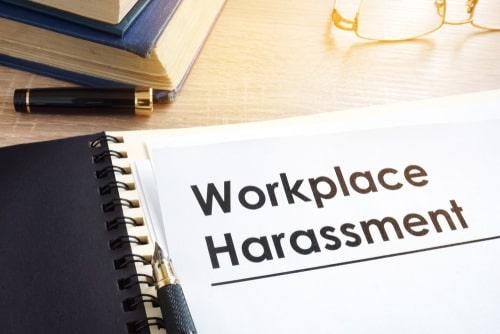Wheaton |
St. Charles |
Sycamore
 630-665-7300
630-665-7300
Recent Blog Posts
When Does Flirting in the Workplace Become Sexual Harassment?
 Flirting and making crude jokes with coworkers is unwise behavior for a number of reasons. Everybody has a different threshold for tolerating this behavior; what someone finds funny, someone else may find downright offensive, and what one person views as harmless flirtation may be perceived by someone else as unwanted harassment. Even a casual observer may object to behavior or language they see or overhear.
Flirting and making crude jokes with coworkers is unwise behavior for a number of reasons. Everybody has a different threshold for tolerating this behavior; what someone finds funny, someone else may find downright offensive, and what one person views as harmless flirtation may be perceived by someone else as unwanted harassment. Even a casual observer may object to behavior or language they see or overhear.
Workplaces are staffed by adults who are complex and imperfect. Many people have casual, flirtatious friendships with coworkers that, while they may be ill-advised, do not cross into the domain of sexual harassment. Yet workplace sexual harassment is common, and it is illegal. It causes negative consequences for victims and can interfere with a victim's ability to do his or her job. So how do you know if flirting has crossed a line? And if it has, what can you do about it?
Know The Definition of Sexual Harassment
How Can I Get Divorced in Illinois if My Spouse Will Not Cooperate?
 Although most couples in Illinois typically engage in the divorce process together, in some high-conflict divorces, one spouse will refuse to cooperate in the divorce proceedings. Your spouse may become nonresponsive, refuse to negotiate, or refuse to sign divorce papers. This may be in an attempt to control you, get revenge, or even avoid legal consequences due to previous criminal behavior. Whatever the reasons, a non-cooperative spouse can derail the divorce proceedings and make your life very difficult.
Although most couples in Illinois typically engage in the divorce process together, in some high-conflict divorces, one spouse will refuse to cooperate in the divorce proceedings. Your spouse may become nonresponsive, refuse to negotiate, or refuse to sign divorce papers. This may be in an attempt to control you, get revenge, or even avoid legal consequences due to previous criminal behavior. Whatever the reasons, a non-cooperative spouse can derail the divorce proceedings and make your life very difficult.
Only One Party Has to Sign Divorce Papers
Fortunately, you have legal recourse to complete the divorce process, even if your spouse is noncooperative. A common misconception about Illinois divorces is that both parties need to sign the divorce papers in order to finalize the divorce, but this is not true.
You must make sure your spouse knows about the divorce filing, and then your spouse will have 30 days to respond. If they do not respond to the divorce filing, or file any motions of their own, the court can issue a Default Judgment. Notification of the pending default judgment must then be sent to your spouse.
What is the Difference Between Divorce and Annulment in Illinois?
 Marriages start out with high hopes and good intentions, but people are unpredictable, and some problems cannot be foreseen. Many people have heard the term “annulment” and believe it is an easy alternative to divorce for ending a marriage that recently took place, but this is not so.
Marriages start out with high hopes and good intentions, but people are unpredictable, and some problems cannot be foreseen. Many people have heard the term “annulment” and believe it is an easy alternative to divorce for ending a marriage that recently took place, but this is not so.
From a legal perspective, in Illinois, an “annulment” is legally referred to as a “declaration of invalidity of marriage.” For the sake of brevity, we will refer to a declaration of invalidity of marriage as an annulment as we explore the difference between a divorce and an annulment and when one may be more appropriate than the other.
When Can a Marriage Be Declared Invalid?
An annulment is a court order that says a marriage is not and never was valid and should therefore not be considered legal by the state. A divorce, by comparison, is a court-ordered ending to a valid marriage.
In Illinois, there are four main reasons someone could get a marriage declared invalid:
Bill Cosby's Release from Prison Brings Up Important Points About Sexual Harassment
 Bill Cosby, 83, was released from prison on Wednesday. The Pennsylvania Supreme Court said that the district attorney who prosecuted Cosby was bound by his predecessor's promise not to bring charges against former actor and comedian. Cosby, who had been accused by around 60 women of various types of sexual misconduct, served three years of his 3-10 year prison sentence for the drugging and violating of Andrea Constand in 2004.
Bill Cosby, 83, was released from prison on Wednesday. The Pennsylvania Supreme Court said that the district attorney who prosecuted Cosby was bound by his predecessor's promise not to bring charges against former actor and comedian. Cosby, who had been accused by around 60 women of various types of sexual misconduct, served three years of his 3-10 year prison sentence for the drugging and violating of Andrea Constand in 2004.
Many of the other accusations against Cosby are alleged to have occurred during work-related events, such as auditions or in the green room before television interviews. When such behavior occurs in a work-related setting or between people who work together, the behavior could potentially constitute sexual harassment as well as criminal sexual misconduct. Under federal law, sexual harassment is a form of workplace discrimination, and it is actionable in civil court, even if the behavior is not technically a “crime.”
Illinois Law Prohibits Workplace Sexual Harassment
Can I Object To My Spouse's Choice of Divorce Venue in Illinois?
 The spouse who files for divorce in Illinois gets to choose the location – or the “venue” – of the divorce. This means that, by filing in a particular county's circuit court, he or she decides where the divorce will take place. However, if your spouse has decided to file for divorce in a certain venue and you do not want the divorce to be handled there, you actually have the right to contest their choice of venue.
The spouse who files for divorce in Illinois gets to choose the location – or the “venue” – of the divorce. This means that, by filing in a particular county's circuit court, he or she decides where the divorce will take place. However, if your spouse has decided to file for divorce in a certain venue and you do not want the divorce to be handled there, you actually have the right to contest their choice of venue.
Venue vs. Jurisdiction
In order to understand why a divorce can move to a different court during a divorce case, it is important to distinguish between “venue” and “jurisdiction.” Occasionally, people will use these terms interchangeably, but they are not the same. Venue refers to the county court in which the case is heard. As stated earlier, divorce in Illinois is handled by the circuit court of the county in which the divorce is filed. The standard choice of venue is a circuit court in the county in which one or both spouses live. Jurisdiction refers to the authority of a court to hear a case. Illinois law allows jurisdiction by all county circuit courts over all divorce cases, no matter where the spouses live – if at least one spouse still lives in Illinois.
Madison County, IL, Settles Sexual Harassment Lawsuit
 A settlement has been reached in a sexual harassment lawsuit against Madison County, Illinois. The substantial settlement amount – $850,000 – was awarded to the plaintiff, an employee of Madison County, who alleged that a former Madison County board member repeatedly sexually harassed her. The plaintiff then alleged that in addition to the board doing nothing to stop the harassment, she was fired for complaining.
A settlement has been reached in a sexual harassment lawsuit against Madison County, Illinois. The substantial settlement amount – $850,000 – was awarded to the plaintiff, an employee of Madison County, who alleged that a former Madison County board member repeatedly sexually harassed her. The plaintiff then alleged that in addition to the board doing nothing to stop the harassment, she was fired for complaining.
The details in this case reflect circumstances that are often faced by victims of workplace sexual harassment. Below we will explore some of these circumstances, the relevant laws, and what you can do if you face sexual harassment at your place of employment.
A Hostile Work Environment
There are two primary categories wherein behavior of a sexual nature constitutes sufficient sexual harassment to file a civil lawsuit. One of the cases is called “quid pro quo” – when one person promises a job or a favor at work, such as a promotion, in exchange for sexual favors.
How to Change Your Name After an Illinois Divorce
 When a couple gets divorced in Illinois, a partner who shared their spouse's last name may decide they want their maiden name back. How this is done depends on whether the name change happens as part of the divorce decree or whether you wait until after the divorce is over.
When a couple gets divorced in Illinois, a partner who shared their spouse's last name may decide they want their maiden name back. How this is done depends on whether the name change happens as part of the divorce decree or whether you wait until after the divorce is over.
Changing Your Name During the Divorce
A divorcing spouse can request that a change back to their maiden name be included as part of their final divorce decree. Consult your attorney to make sure that that you are given the right to resume use of a former or maiden name as part of the court order dissolving the marriage.
Generally, part of changing your name in Illinois is publishing the name change in a local public newspaper. However, if the divorce decree includes the reversion to your maiden name, you do not have to publish a notice with a newspaper; the divorce decree will be the document that public agencies will use to change your last name on official documents.
Do We Have to Move Out to Get Divorced in Illinois?
 When a couple knows the marriage is over, divorce is inevitable. However, before couples can divorce, Illinois law requires them to meet a legal standard that shows they have irreconcilable differences, that past attempts at fixing the marriage have failed, and that future attempts would fail as well.
When a couple knows the marriage is over, divorce is inevitable. However, before couples can divorce, Illinois law requires them to meet a legal standard that shows they have irreconcilable differences, that past attempts at fixing the marriage have failed, and that future attempts would fail as well.
Couples can still live together, file for divorce in Illinois, and finalize the divorce on the same day - as long as there isn't any objection from either party. But if one party does object, or denies there are irreconcilable differences, a six-month separation period is considered proof by the court that there are irreconcilable differences and that the marriage has broken down.
In this article, we'll explore what it means to live separate and apart, and how couples who wish to do it can establish the six-month separation period.
What is a Separation Date?
Living separate and apart for six months shows that a couple has reached the point where their differences are irreconcilable, that they have considered the ramifications of divorce seriously, and that divorce is still the best option.
How to Document Sexual Harassment in the Workplace
 Freedom from sexual harassment is encoded in Illinois law under the Illinois Human Rights Act. Unfortunately, that does not always prevent people from being sexually harassed at work. A shocking half of all women have been the recipient of unwanted verbal or physical sexual harassment at work, but a very small portion of the victims in these cases hire a lawyer and go to court.
Freedom from sexual harassment is encoded in Illinois law under the Illinois Human Rights Act. Unfortunately, that does not always prevent people from being sexually harassed at work. A shocking half of all women have been the recipient of unwanted verbal or physical sexual harassment at work, but a very small portion of the victims in these cases hire a lawyer and go to court.
Proving sexual harassment can be difficult as it often comes down to relying on individual witness testimony, and it can be hard to judge whether one witness is more credible than another. Adding to the difficulty, the law requires the individual's behavior to be “severe or pervasive” to qualify as “hostile work environment” sexual harassment. This standard is subjective – meaning it is open to fairly wide interpretation – and different judges have interpreted it differently.
Keep a Log of the Harassment
If you are the victim of sexual harassment or retaliation and interested in pursuing a case against your harasser, documenting each incident and keeping records of the harassment can help. It may not be pleasant to do so, but the goal is to stop the harassment – whatever it takes. The following are some examples of details to write down:
Recovering Delinquent Child Support in Illinois
 Achieving a child support plan between two parents who are no longer together can be a very difficult task. After the court determines a payment plan based on the parents' respective net incomes, the paying parent can fall behind on payments. Sometimes this is accidental, and sometimes it is intentional; but no matter why a parent stops paying child support, the child's well-being may be compromised when funds are not available to the receiving parent to meet the child's needs.
Achieving a child support plan between two parents who are no longer together can be a very difficult task. After the court determines a payment plan based on the parents' respective net incomes, the paying parent can fall behind on payments. Sometimes this is accidental, and sometimes it is intentional; but no matter why a parent stops paying child support, the child's well-being may be compromised when funds are not available to the receiving parent to meet the child's needs.
If you find yourself in this situation, you have options available to you.
Collecting Child Support from a Nonpaying Parent
The Illinois Family and Healthcare Services Division of Child Support Services (DCSS) is tasked with enforcing child support payments. However, you should be aware that DCSS is often underfunded and understaffed, and it can often take a very long time to resolve your case. This is why it is often best to work with an experienced family law attorney. Your lawyer can expedite the process and help you pursue the financial support you and your child need through the civil court system. Once you notify the court that the paying or “obligor” parent is not meeting their child support obligations, there will be a hearing to determine the next steps.


 Read More
Read More





